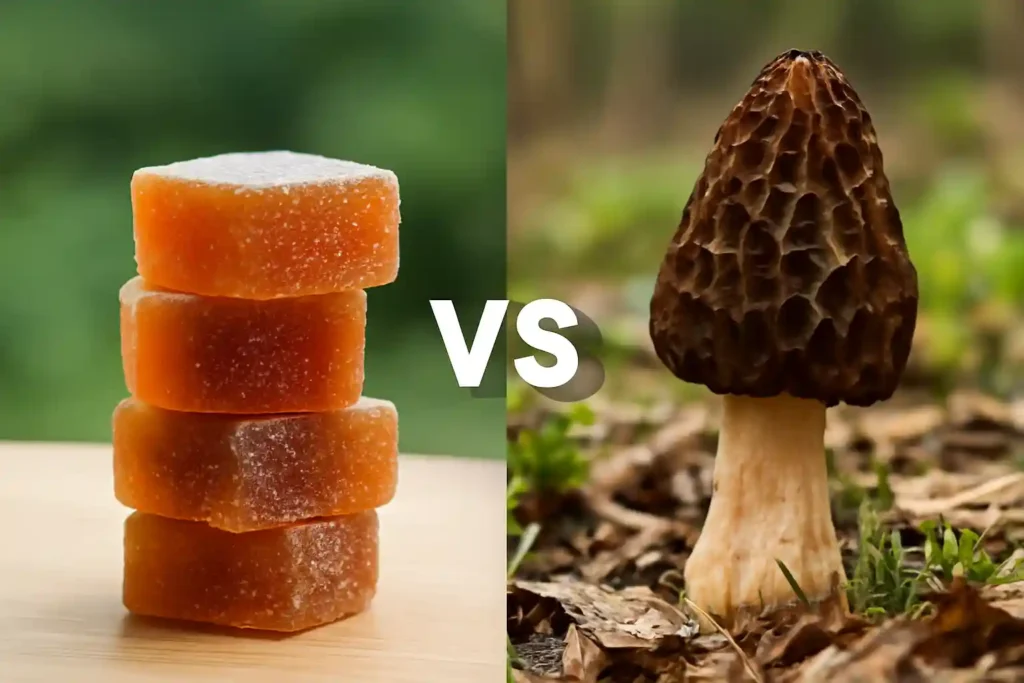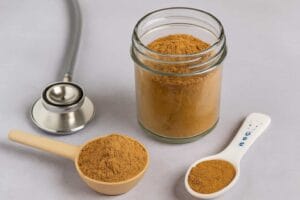In the quest for enhanced cognitive health, natural supplements have gained significant attention. Among these, mushroom-based products stand out for their potential brain-boosting properties. Today, we delve into the comparison of Mushroom Gummies vs Morel Mushroom for Brain Function, exploring their benefits, differences, and how each might support mental clarity, memory, and overall brain health. Whether you’re considering convenient supplements or natural fungi, understanding these options can help you make an informed choice. For more insights on mushroom supplements and cognitive health, check out our detailed guide on Mushroom Gummies vs Lion’s Mane Mushroom for Cognitive Health.
Mushroom Gummies vs Morel Mushroom for Brain Function: Understanding the Basics
To appreciate the nuances between mushroom gummies and morel mushrooms, it’s essential to understand what each offers in terms of brain health benefits.
What Are Mushroom Gummies?
Mushroom gummies are dietary supplements infused with extracts from various medicinal mushrooms known for their neuroprotective and cognitive-enhancing properties. These gummies typically contain blends of mushrooms such as Lion’s Mane, Reishi, Cordyceps, and Chaga, formulated for easy consumption and consistent dosing.
Morel Mushrooms: A Natural Brain Booster?
Morel mushrooms are wild fungi prized for their rich flavor and nutritional content. While they’re less commonly studied than medicinal mushrooms like Lion’s Mane, morels contain antioxidants, vitamins, and minerals that may indirectly support brain function by reducing oxidative stress and inflammation.
Comparing Cognitive Benefits: Mushroom Gummies vs Morel Mushroom for Brain Function
When evaluating Mushroom Gummies vs Morel Mushroom for Brain Function, several factors come into play, including bioavailability, convenience, potency, and scientific backing.
| Feature | Mushroom Gummies | Morel Mushroom |
|---|---|---|
| Primary Brain Benefits | Enhanced memory, focus, and neuroprotection via targeted mushroom extracts | Antioxidant support and general brain health through nutrient density |
| Convenience | Easy to consume, pre-measured doses, portable | Requires cooking, seasonal availability, less convenient |
| Scientific Research | Extensive studies on individual mushroom extracts like Lion’s Mane and Reishi | Limited direct research on cognitive effects, more focused on nutrition |
| Bioavailability | Formulated for maximum absorption | Natural form but variable absorption depending on preparation |
| Additional Health Benefits | Immune support, stress reduction, energy boost | Rich in vitamins, minerals, and antioxidants |
How Mushroom Gummies Support Brain Function
Mushroom gummies often combine extracts from several medicinal mushrooms, each contributing unique brain benefits:
- Lion’s Mane: Known for stimulating nerve growth factor (NGF), which promotes neurogenesis and cognitive function.
- Reishi: Supports stress reduction and immune health, indirectly benefiting cognitive clarity. Learn more about its benefits on bone and overall health in our article on Reishi Mushroom for Supporting Bone Health.
- Cordyceps: Enhances energy and oxygen utilization, potentially improving mental stamina.
These combined effects mean mushroom gummies are not only convenient but also a potent way to target brain function through multiple pathways.
Morel Mushrooms: Nutritional Profile and Brain Health Potential
Morel mushrooms are a culinary delicacy rich in nutrients such as:
- Vitamin D – essential for brain health and mood regulation
- Antioxidants – combat oxidative stress linked to cognitive decline
- Iron and copper – support oxygen transport and neurotransmitter synthesis
While morels do not have the concentrated neuroactive compounds found in some medicinal mushrooms, their nutrient density can contribute to maintaining a healthy brain environment. However, their seasonal availability and preparation requirements make them less practical for daily cognitive support compared to mushroom gummies.
Which Is Better for Cognitive Enhancement?
Choosing between mushroom gummies and morel mushrooms depends on your goals, lifestyle, and preferences. Here’s a quick guide:
- For targeted brain function support: Mushroom gummies, with scientifically studied extracts, offer a more direct and reliable cognitive boost.
- For nutritional variety and culinary enjoyment: Morel mushrooms provide antioxidants and nutrients that support overall brain health but are less potent as nootropic agents.
- For convenience and consistency: Gummies win due to ease of use and standardized dosing.
If you’re interested in exploring other mushroom varieties for holistic wellness, consider reading about the Reishi mushroom for supporting bone health, which also offers indirect benefits for brain function through stress modulation.
Safety and Side Effects
Both mushroom gummies and morel mushrooms are generally safe when consumed responsibly. However, some considerations include:
- Mushroom Gummies: Check for allergies to specific mushroom types and consult with a healthcare provider, especially if pregnant or on medication.
- Morel Mushrooms: Must be properly cooked to eliminate toxins; raw morels can cause digestive upset.
Final Thoughts on Mushroom Gummies vs Morel Mushroom for Brain Function
In summary, while morel mushrooms offer nutritional benefits that support brain health, mushroom gummies provide a more targeted, convenient, and scientifically supported approach to enhancing cognitive function. Incorporating either into your wellness routine can be beneficial, but for those seeking focused brain support, mushroom gummies are a compelling choice.
F.A.Q
- What makes mushroom gummies different from eating morel mushrooms for brain health?
Mushroom gummies typically contain concentrated extracts of medicinal mushrooms designed to support cognitive function directly, whereas morel mushrooms provide general nutrition that supports brain health indirectly. - Are there any scientific studies supporting mushroom gummies for brain function?
Yes, many studies have investigated the neuroprotective effects of mushrooms like Lion’s Mane and Reishi, which are commonly included in mushroom gummies. For detailed scientific insights, you can visit Healthline’s overview of medicinal mushrooms. - Can eating morel mushrooms regularly improve memory and focus?
While morel mushrooms are rich in antioxidants and nutrients beneficial for brain health, their direct effects on memory and focus are less documented compared to specific medicinal mushrooms found in gummies. - How often should I take mushroom gummies for optimal brain benefits?
Consistency is key. Most manufacturers recommend daily intake, but it’s best to follow the dosage instructions on the product label and consult with a healthcare professional. - Is the comparison of Mushroom Gummies vs Morel Mushroom for Brain Function relevant for all age groups?
The comparison is generally applicable, but individual needs vary by age and health status. Mushroom gummies may be more suitable for those seeking targeted cognitive support, including older adults, while morel mushrooms can be a nutritious addition to any diet. For more information on mushroom benefits across different health aspects, see our article on Reishi Mushroom for Enhancing Respiratory Health.



